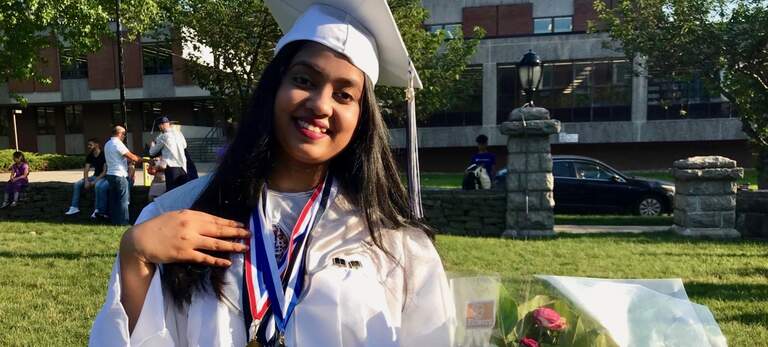As seniors across the country are working hard on college applications, we are showcasing college application essays by iMentor students.
Mohona, formerly an iMentor NYC student, graduated from Marble Hill School for International Studies in Bronx, NY in 2019 and is now a first-year student at Wesleyan University. In her college application essay, she shares how she defied cultural expectations and is taking a path to become an engineer.
My father left his life and relatives behind in Bangladesh and decided to move our family to New York for our better education and future. His belief in me gave me the strength to dream.
In my country, Bangladesh, where most girls get married at the age of 13, I dreamed of going to graduate school. Where more than nine out of 10 girls get harassed by men on their way to school, I dreamed to stand alongside men with equal rights and equal respect.
The expectation that I have lived with all my life is that girls are only good for keeping house and focusing on children. The stereotype in Bangladeshi culture is that only boys can become engineers and that haunted me. When I finally shared my interest in becoming an engineer, my uncle said, “Engineering!? That’s for boys. You shouldn’t do that.” It was not the first time my relatives discouraged me from pursuing my dreams.
I began my journey to become an independent girl during the flight from Bangladesh to America, when I suddenly became the caretaker as my parents couldn’t speak English. While growing up as the eldest daughter in a conservative Muslim society, I was considered the treasure of the family. The treasure that always needs to be kept in check, always hidden, always polite and always standing behind the elders.
But it was different in America. Even though the culture I came from still lingers here, my education in the US gave me a chance to break away. It put control of my life in my own hand. When I left Bangladesh, my roots were cut, like a plant torn from the soil. But in my new American school, those roots started growing back, and I thrived, growing branches that never would have been possible in the land where I was born.
I was delighted. Despite three hours commuting daily from school to home and tons of responsibilities towards siblings, high school was still chappan bhog for me, a traditional Bengali plate consisting of 56 different dishes, and I took every opportunity the smorgasbord presented to me. I even created my own opportunities.
I went from the quietest student in the class to a screaming activist leading a crowded protest. I went from a girl who always stands behind her parents to the president of student government. I went from the girl who never went outside alone to the girl who will travel to China next year through the China Exchange Program. I went from the classic Bengali dancer and singer to a researcher at Columbia University.
Due to my diverse interests, I tasted all the 56 dishes in high school, but researching at Columbia University for two summers was like kheer, the best part of the chappan bhog. Kheer is a sweet dish made with rice, milk and a lot of sugar, which I would eat every day for the rest of my life if I could.
Even though I always knew I wanted to become an engineer, I was unsure of the field I wanted to specialize in, but working in the chemical engineering lab and understanding the bigger view of the projects helped me realize how research can contribute to humans’ well-being. These scientific researchers find cures for different diseases and also can provide better health care services. I not only came to love the excitement of learning simply for the sake of knowing something new, but I also came to understand the idea of giving back to the community in exchange for a new sense of life, love, and spirit.
I am the daughter of a man who came from a village in Bangladesh where girls never finish high school, and my dream is to be the woman who helps create affordable cures for the diseases that destroy lives and families in that village and villages like it around the world.

